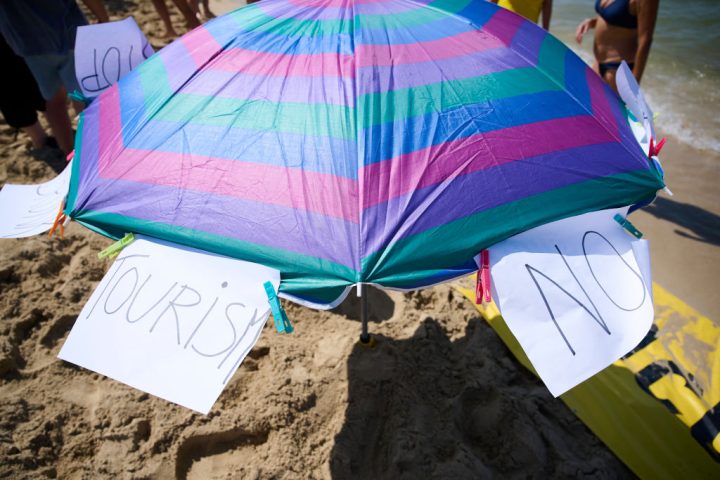Believing that membership of the European Union was undeniably beneficial for the UK economy, many Remainers struggled to understand why the majority had voted against it. One hypothesis was that ‘Leavers’ felt they’d missed out on the benefits – that perhaps people who thought the wealth hadn’t been spread around fairly had voted for Brexit in order to teach the greedy elite a lesson.
Here in Spain, it’s tourism that, to the authorities’ surprise, has suddenly proved unpopular. It’s easy to see why they considered tourism to be undeniably beneficial. After all, it accounts for about 13 per cent of GNP and a quarter of the new jobs created in the country last year. So surely, then, it’s good that this year Spain is likely to receive some hundred million tourists (up from 85 million last year), making it the most visited country in the world?
Could it be that the protesters feel that the wealth that tourism brings is not being shared out fairly?
But, it turns out, not everybody thinks so. This summer has seen well-organised waves of hostility towards tourism across Spain. In Barcelona and Madrid, in Málaga, San Sebastián, Seville, Alicante, Cádiz, and in the Balearic and the Canary Islands, angry locals have gathered in their thousands. Their banners are written in English: ‘Tourism kills the city’, ‘Your trip, our misery’, ‘Tourist go home’. And, just in case the message still isn’t clear enough, in some cases they’ve also used water pistols to chase tourists out of street cafés and off restaurant terraces. In Mallorca last month locals organised a dawn swoop to occupy one of the tourists’ favourite beaches.
Could it be that the protesters feel that the wealth that tourism brings is not being shared out fairly? In Plasencia last weekend my wife and I enjoyed a leisurely late breakfast in the beautiful Plaza Mayor while one waiter struggled to serve 14 tables – no joke as the temperature soared to 37 celsius. Our waiter was not only severely overworked, he was also almost certainly underpaid. Though their labour is essential, many hard-working hospitality staff work long, hard, anti-social hours for the national minimum wage of just over €1,100 (£934) a month. Our breakfast cost €16 (£13.60) – a sum that it might take a waiter or hotel cleaner two hours to earn.
Meanwhile, as tourist numbers have soared, more and more flats have been taken off the long-term market and converted to short-term holiday lets. The dwindling supply has driven a sharp increase in the cost of long-term rentals; in Ibiza a single room costs between €700 (£595) and €1,000 (£850) a month. No wonder then that in the Canaries and the Balearic Islands many hospitality workers now have to live in tents and cars.
Locals also blame the visitors for the traffic jams, water shortages, pollution and environmental degradation, for loutish behaviour, overcrowding on public transport and the long queues in Accident and Emergency departments. Politicians – local, regional and national – are rushing to find solutions for a problem that they never saw coming. Tourism taxes, crackdowns on short-term holiday rentals, limiting the size of tour groups, fines for anti-social behaviour, high-end marketing to attract quality tourism and more investment in local infrastructure are all suddenly being discussed. Meanwhile, just as in the UK people were warned not to have the temerity to vote for Brexit, so in Spain politicians have warned that the protesters should be careful what they wish for – it was tourism that lifted them out of poverty.
On that last point, many poorly-paid workers in the hostelry industry beg to differ. Tourism, they say, has in fact made them worse off because they can no longer afford to live in the parts of town where their families had lived for generations: ‘I used to live in a friendly neighbourhood in the centre where everyone knew everyone. Now it’s a tourist theme park and I have to live way out of town,’ one waitress told me.
She has a point: whatever the economic benefits of tourism, it has also transformed local landscapes, ‘Disneyfying’ town centres as locals are forced out to make room for short-stay visitors. Maybe then there’s another point of similarity between Spain’s anti-tourist sentiment and Britain’s vote for Brexit. Like many ‘Leavers’, perhaps the Spaniards protesting against mass tourism can best be understood as ‘Somewhere’ people – people who feel a strong attachment to a cohesive, local community with shared values?







Comments